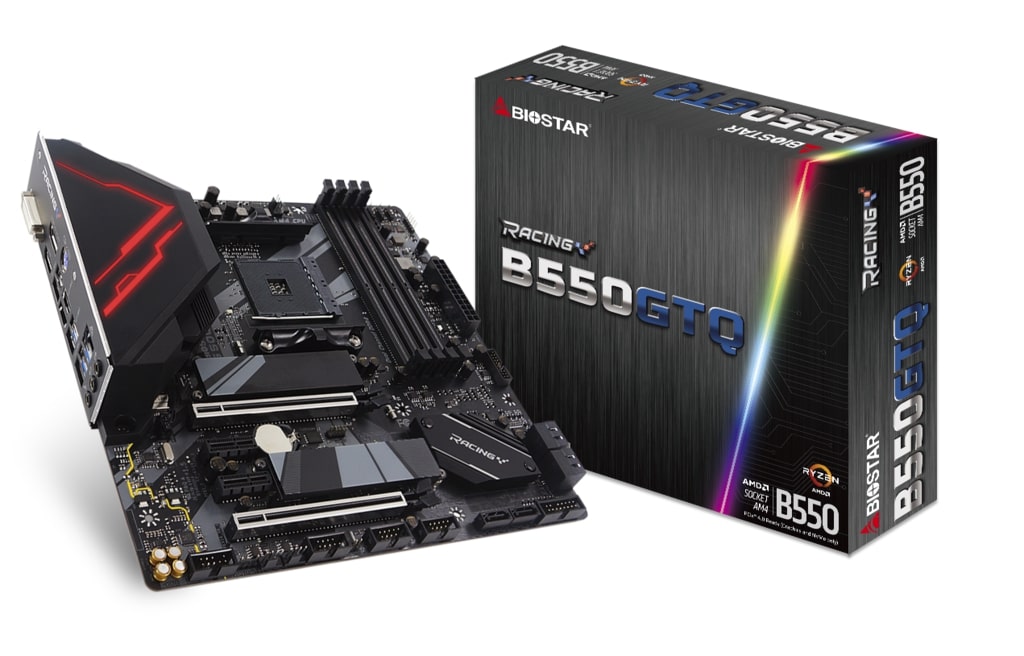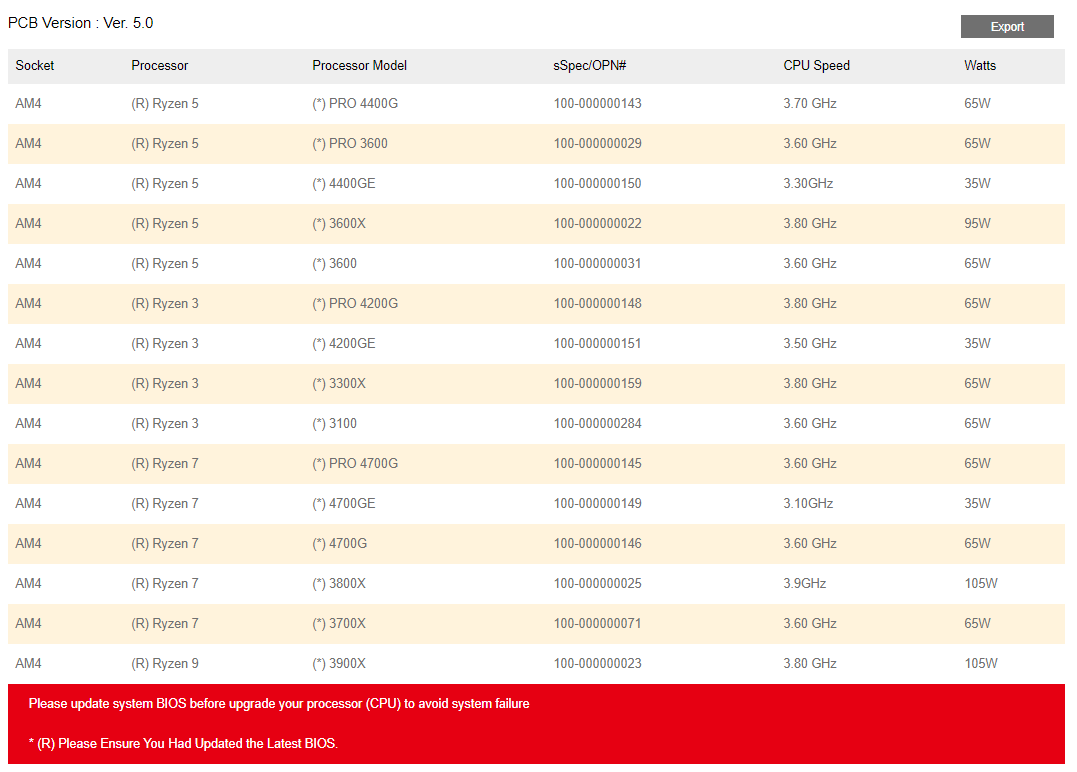Biostar Reveals Specifications For AMD Ryzen 4000 Renoir APUs
Biostar has been a great source of information for AMD's looming Ryzen 4000-series (codename Renoir) desktop APUs. After exposing Renoir's lack of support for PCIe 4.0 yesterday, the motherboard manufacturer has now spilled the beans on the specifications for the Zen 2 APUs.
Eagle-eyed hardware sleuth @KOMACHI_ENSAKA discovered that Biostar has listed the Renoir chips in the Racing B550GTQ motherboard's list of supported Ryzen processors. Although the manufacturer attempted to keep the details to a minimum, we still have the the previous leak from German publication Igor's Lab to fall onto. After a quick comparison, Igor's specifications concur with Biostar's listed specifications, so there are grounds to assume that the core counts should be spot on as well.
As a quick recap, Renoir will be on AMD's Zen 2 microarchitecture and feature the 7nm FinFET manufacturing process from TSMC. Thus far, the Ryzen 7 and Ryzen 5 models appear to arrive with eight-core, 16-thread and six-core, 12-thread designs, respectively. Lastly, the Ryzen 3 SKUs seem to stick with a simple four-core, eight-thread setup.
AMD Ryzen 4000-Series Renoir Specifications
| Model | OPN | Base Clock (GHz) | TDP (W) |
|---|---|---|---|
| Ryzen 7 4700G | 100-000000146 | 3.6 | 65 |
| Ryzen 7 Pro 4700G | 100-000000145 | 3.6 | 65 |
| Ryzen 7 4700GE | 100-000000149 | 3.1 | 35 |
| Ryzen 5 Pro 4400G | 100-000000143 | 3.7 | 65 |
| Ryzen 5 4400GE | 100-000000150 | 3.3 | 35 |
| Ryzen 3 Pro 4200G | 100-000000148 | 3.8 | 65 |
| Ryzen 3 4200GE | 100-000000151 | 3.5 | 35 |
Surprisingly, Biostar only included seven Renoir parts in the support list. Igor's leak had pointed to a total of 12 models, encompassing the three normal 65W SKUs with their respective Pro and 35W GE-series variants. It's entirely possible that Biostar hasn't finished working on the list, and it was likely not supposed to be available to the public yet.
The standard Ryzen 7 4700G ticks with a 3.6 GHz base clock, while its GE counterpart rocks a 3.1 GHz base clock. Since this is the first time that AMD is introducing an octa-core APU, there's no eligible candidate for comparison from last generation. The closest SKU is the Ryzen 7 3700X that also comes with eight cores and 16 threads and a 65W TDP (thermal design power). The Ryzen 7 4700G's boost clock speed has yet to be confirmed, but it shares the 3.6 GHz same base clock as the Ryzen 7 3700X.
For the Ryzen 5 series, the Ryzen 5 Pro 4400G shows a 3.7 GHz base clock, so the Ryzen 5 3600 would be the APU's direct comparison. Surprisingly, the Ryzen 5 Pro 4400G actually boasts a 100 MHz higher base clock than the Ryzen 5 3600. It remains to be seen whether the the APU will outclass the Ryzen chip in boost clocks.
Biostar lists the Ryzen 3 Pro 4200G with a 3.8 GHz base clock. Now that AMD has enabled simultaneous multithreading (SMT) on the Ryzen 3 SKUs, the APU is comparable to last generation's Ryzen 5 3400G. Once again, we don't know the boost clock, but the Ryzen 3 Pro 4200G's boost clock is 100 MHz faster than the Ryzen 5 3400G.
Get Tom's Hardware's best news and in-depth reviews, straight to your inbox.
Despite all the leaks and rumors surrounding Renoir, there's still no details on when AMD will release the Zen 2-powered APUs. Obviously, the specifications look great on paper, and Renoir will no doubt take AMD's APU game to another level.

Zhiye Liu is a news editor, memory reviewer, and SSD tester at Tom’s Hardware. Although he loves everything that’s hardware, he has a soft spot for CPUs, GPUs, and RAM.
-
Alvar "Miles" Udell Thing is though, you will only be able to use them with certian motherboards, as a video output will be required. Also, it will still be weak, quite likely unable to exceed entry level discrete cards, yet carry a higher price tag than their non APU counterparts.Reply
The only reason to be "excited" about them that I can see is that AMD and nVidia have essentially colluded to keep GPU prices in excess of $200 (RX 580/90 doesn't count as they're still backstock from Cryptoboom meltdown), even though at that price you can't (yet) ensure a 1080p60 experience.
I have a distinct feeling TomsHardware, as well as the other reputable sites, will echo the same sentiment that while Renoir takes APUs to a new level, the lack of PCIe 4, B series motherboard requirement, and lack of graphical performance makes them a hard pass for a marriage of Matisse and Navi/Ampere, especially if certain rumors are true and Renoir is simply a higher clocked Ryzen Mobile 4000 series chip in a Socket AM4 form factor. -
e36_Jeff There are at least 37 x570 boards with some kind of video out port, and virtually all the lower chipsets have some kind of video out. By my count, you are 'limited' to around 120 mobos, which isn't really a limit at all.Reply -
Alvar "Miles" Udell Not necessarily. Being under the 4000 series brand it's entirely likely AMD will limit them to 500 series boards, which again eliminates the cheap upgrade path for users of an existing APU which means they will achieve higher performance by just buying a dedicated card.Reply -
cryoburner Reply
AMD announced several days ago that they would in fact enable Ryzen 4000-series processors to run on 400-chipset motherboards. You posted in the comments of an article discussing that, so I would assume you are aware. >_>Alvar Miles Udell said:Not necessarily. Being under the 4000 series brand it's entirely likely AMD will limit them to 500 series boards, which again eliminates the cheap upgrade path for users of an existing APU which means they will achieve higher performance by just buying a dedicated card.
As for those with an existing APU, the improvements to graphics performance alone might not be enough to justify buying a new processor, but the main draw here is having access to processors with higher core counts that don't require a dedicated GPU. Not necessarily for gaming, but for desktop productivity use, where graphics performance often isn't much of a concern. And for that use, adding significantly more graphics cores would just increase the cost of the processor and possibly make cooling more of an issue. It might be a nice extra that the integrated graphics of these chips can run many recent games at low graphics settings, but if someone cares about gaming performance much, they probably should drop at least an extra $130 on an RX 570, or maybe $160 or so for something like a 1650 SUPER, 5500 XT or RX 580. -
Alvar "Miles" Udell AMD said:Reply
"The select beta BIOSes will enable a one-way upgrade path for AMD Ryzen Processors with “Zen 3,” coming later this year. Flashing back to an older BIOS version will not be supported. "
And as these are Zen 2 processors, that says to me support is still questionable, given how AMD is crying about no more space available, and there are still yet another set of Zen 2 Matisse+ processors to potentially add as well.
As for productivity, yes you can make the argument that 4 additional CPU cores would be beneficial, but I'm struggling to come up with a setting where 8 CPU cores would be highly beneficial over 4 cores, yet the GPU would be irrelevant given how many tasks are GPU accelerated.

